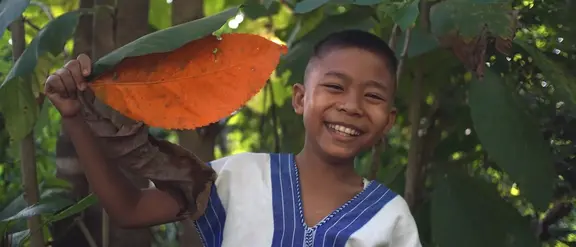Children's rights organizations are demanding fair climate policies.
The well-being of children must be at the heart of climate policy. This is the demand made by children's rights organizations in Germany to the federal government. It must advocate for this internationally at the 30th UN Climate Change Conference (COP30) in Belém, Brazil.
In a joint position paper, the German Committee for UNICEF, The Duke of Edinburgh's International Award - Germany, Kindernothilfe, the National Coalition Germany - Network for Children's Rights, SOS Children's Villages Worldwide, Terre des Hommes Germany and other organizations appeal: The German government must strongly advocate that the rights of present and future generations of children and young people become the basis of all climate policy decisions at the climate conference.
The individual demands at a glance:
- National climate protection contributions, adaptation strategies and monitoring systems must be aligned with the interests of children and young people.
- Children and young people must be involved in climate policy decision-making processes in a way that is based on children's rights.
- Climate finance must be geared towards the needs of children and young people.
- Losses and damages to children and young people must be compensated.
- Children's rights in the context of climate-related migration must be consistently taken into account.
Climate change is causing disproportionate damage to today's children and future generations over their lifetimes: According to UNICEF, over one billion children worldwide live in regions that are extremely exposed to the effects of climate change. Almost 90 percent of all climate-related health risks affect children under five. Heat, floods, air pollution, and other environmental stressors cause lifelong health problems, particularly in toddlers, infants, and unborn children, and can severely limit their developmental opportunities.
The climate crisis is a crisis of children's rights. It is not an abstract future scenario. For children in many regions of the world, especially in the Global South, it is already a harsh reality. Ambitious climate protection and adaptation measures are therefore not optional, but vital for the well-being and future of billions of children worldwide.
Children in Europe are increasingly suffering from the effects of climate change: Heat waves are occurring much more frequently and intensely in many European regions. This increases the risk of heat stress, dehydration, and respiratory illnesses in children. 2024 was the warmest year on record in both Germany and Europe since regular measurements began.
The negotiations at the 30th UN Climate Change Conference (COP30) in Belém are crucial, especially for the lives of children. This is demonstrated by the current drastic intensification of the consequences of climate change ten years after the Paris Agreement. As a wealthy industrialized nation, Germany is in a strong position to better enshrine and implement children's rights in climate policy, both nationally and internationally. This is not only an ecological necessity, but also an investment in the well-being and future of the younger generation, and thus in the stability of societies worldwide.
Here you can access the position paper with all demands in detail.
The following organizations have signed the position paper:
- Working Group for Children with Allergies
- German Children's Aid Organization
- German Committee for UNICEF
- Duke of Edinburgh's International Award - Germany
- Children's emergency aid
- National Coalition Germany - Network for Children's Rights
- Pestalozzi-Fröbel Association
- Plan International
- SOS Children's Villages worldwide
- Terre des Hommes Germany
